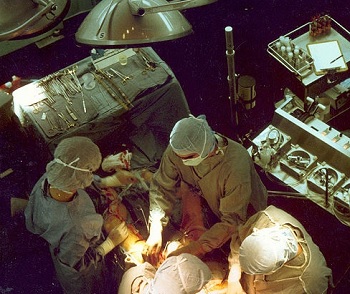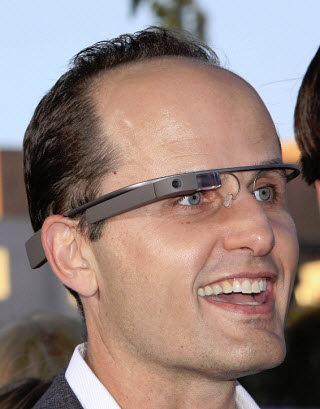This was the first time that the augmented reality headset had been used for this purpose.
For the very first time ever, a surgeon in China used a Google Glass headset device to broadcast the full procedure of an orthopedic surgery so that it could be viewed, live, by his colleagues in other parts of Asia, as well as in Europe, on their tablets and smartphones.
The surgery was conducted by a highly known and reputable orthopedic surgeon at a hospital in China.
The surgery was conducted by an expert in the reattachment of limbs that have been severed. The doctor wore the Google Glass augmented reality device in order to be able to live-cast the complete procedure using the 500 megapixel camera of the wearable technology gadget. While this event may have been only the first of its kind, recent reports have been suggesting that this could be situation that becomes increasingly common in the future.
The hospital is currently in talks to help to expand the use of Google Glass and other forms of mobile technology.
 Technology news reports – such as those in the Wenwei newspaper, which is state operated – have stated the Shanghai 6th People’s Hospital is currently in discussions with app developers in order to be able to broaden the exploration of the possibility of interactions between humans and machines, on site in the hospital. Among the possibilities that could be among those being discussed is the ability to conduct surgical procedures through the help of 3D images that are displayed in augmented reality while wearing AR glasses.
Technology news reports – such as those in the Wenwei newspaper, which is state operated – have stated the Shanghai 6th People’s Hospital is currently in discussions with app developers in order to be able to broaden the exploration of the possibility of interactions between humans and machines, on site in the hospital. Among the possibilities that could be among those being discussed is the ability to conduct surgical procedures through the help of 3D images that are displayed in augmented reality while wearing AR glasses.
The surgeon’s name is Chen Yunfeng. While he is not the first to use augmented reality glasses in the operating room, he is the first one to use them in order to transmit a live broadcast to doctors in other locations such as other continents.
The medical industry is among those that is seeing the most potential for Google Glass. There are an increasing number of reports being released as various doctors and hospitals come up with new and clever ways to use the technology in order to improve the healthcare that they are able to provide.
These augmented reality glasses are being tested for use with medical conditions.
Starting at the end of last week, the emergency department at Rhode Island Hospital became the first one in the country to start to use Google Glass and its associated wearable technology for streaming live images of the medical conditions of the patients who were being seen there, in order to be able to consult with a specialist who was located somewhere other than in the hospital.
This is the start of a feasibility study that is meant to test the augmented reality glasses for six months.
Should the use of the Google Glass prove to be successful, Dr. Paul Porter, the project coordinator, believes that the use of these mobile devices will only expand in the medical arena. Potential users could include first responders in ambulances, surgeons, and others who could benefit from the recommendations of specialists while they are on the field or when there is no local specialist available.
Porter is highly enthusiastic about the possibilities for Google Glass in the health care environment.
He stated that it would be “like the Holy Grail” but added that “we’re just at the beginning; you have to start somewhere.” At the moment, the hospital will continue to test this wearable technology exclusively with emergency room patients who are suffering from various forms of dermatological struggles, such as skin rashes. These patients must volunteer to be a part of the study as opposed to being automatically entered into it.
The reason is that Porter feels that the standard of health care at the moment makes it so that handling these types of problems within an emergency room typically involves a basic visual inspection while asking the patient certain types of questions such as whether or not it is itchy, painful, etc.
The reason that these specific types of cases have been chosen for testing Google Glass in the emergency room is that if any glitches should occur within this wearable technology – such as a loss of the connection for audio or video – then the life and health of the patient will not be placed at risk.
 Technology news reports – such as those in the Wenwei newspaper, which is state operated – have stated the Shanghai 6th People’s Hospital is currently in discussions with app developers in order to be able to broaden the exploration of the possibility of interactions between humans and machines, on site in the hospital. Among the possibilities that could be among those being discussed is the ability to conduct surgical procedures through the help of 3D images that are displayed in augmented reality while wearing AR glasses.
Technology news reports – such as those in the Wenwei newspaper, which is state operated – have stated the Shanghai 6th People’s Hospital is currently in discussions with app developers in order to be able to broaden the exploration of the possibility of interactions between humans and machines, on site in the hospital. Among the possibilities that could be among those being discussed is the ability to conduct surgical procedures through the help of 3D images that are displayed in augmented reality while wearing AR glasses.

